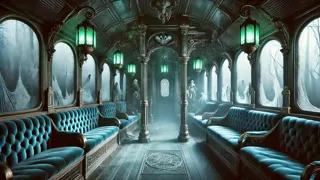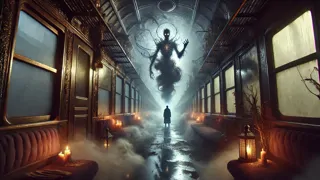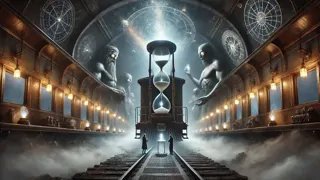Introduction
At exactly midnight, when the last ember of the dying day has flickered into oblivion, a low rumble disturbs the silent tracks that thread through the plains of the American Midwest. No ordinary train whistles in the gloom. This one drips with otherworldly menace—a phantom locomotive known in certain whispered circles as the Underworld Express. It appears without warning, its iron wheels steaming spectral vapors tangled with stray motes of phosphorescent light. At its prow, a brass lantern glows with impossible hues—emerald flickers entwined with cobalt flames—casting fractured patterns of doom and promise across the deserted station platform. There, under clouds thick like spilled ink, curious souls gather: grieving widows clutching tattered letters, wayward loners haunted by guilt, reckless seekers chasing forgotten debts. None can deny the draw of the Express. Boarding it is a pact with forces that predate the first hieroglyph. Each passenger dares to negotiate with ancient gods—deities who have claimed dominion over death itself—for the freedom of condemned spirits or the redemption of wounded hearts. Lanterns swing from iron hooks within the carriages, illuminating swirling dust motes that dance like lost memories. The seats are smooth and cool, carved from ebony wood veined with silver runes that hum faintly when touched. Every rail on this cursed line seems drawn from a myth that time itself forgot. And as the whistle shatters the stillness—piercing, agonized—it summons the riders to face a journey impossible to forget: a voyage across the threshold between life and obliteration, where courage flickers dimly but might blaze into defiance against immortal dread.
Midnight Departure
The platform creaked under the weight of silence and anticipation. Riders gathered in fractured knots beneath the lantern’s emerald glow, their breath visible in the sudden chill. Among them was Miriam Graves, a history professor whose obsession with myth had drawn her here, and Elias Thorn, a gambler fleeing his own ruin. Neither knew the other, yet both shared the same tremor of dread when the doors hissed open. The interior lingered between beauty and decay: arched windows rimed with frost, velvet drapes frayed at the edges, iron pillars etched with cryptic runes that pulsed in time with the train’s heartbeat. A hush fell as each traveler chose a seat; the air was heavy with stories left untold.

A distant scream—half prayer, half curse—shuddered through the tunnels. The lanterns flared in response, the engine roared to unholy life, and the wheels churned loose the dust of centuries. As the train lurched forward, windows framed arrow-straight tracks that plunged into a tunnel lined with bones, each shard glowing faintly in a violet haze. Conversations faltered; hearts hammered. Miriam pressed her palm to the icy window, reflecting a face both terrified and exhilarated. Elias slid across the aisle, drawn by whispers of divine bargains and impossible mercy. Around them, the cars began to fill with flickers of ghostly form: restless souls bound by grief and guilt, each seeking an audience with the gods rumored to ride in the caboose.
Steam rolled over the seats, carrying with it the scent of embers and ash. In car after car, passengers quaked as unseen forces toyed with their thoughts. Faint voices echoed in corridors: mournful wails of those who’d boarded this train long ago. In the dining car, porcelain goblets brimmed with luminescent wine that tasted of memory, each sip unlocking a vision of cradle and coffin, childhood laughter and the final breath. The gods demanded tribute: a memory, a promise, a confession. Each exchange was a gamble. Under vaulted ceilings painted with constellations unknown to any astronomer, Miriam steeled herself to barter for her brother’s lost soul. Elias counted his final chips, resolved to wager his life for the chance to silence the debts of his past. All around them, hope and despair warred in the shadows of a journey without return.
Bargaining with the Unseen
Beyond the dining car lies the corridor of echoes—an aisle where every footstep summons a chorus of hushed lament. The gods do not appear as golden idols or thunder-wielding titans. They drift at the periphery of vision, shapes woven from darkness and incandescent threads. Some resemble ancient kings clothed in shadow, others writhing serpents with eyes aflame. Negotiations take place in hushed syllables that reverberate through the bones of the train, carried by tendrils of mist that coil around trembling ankles.

Miriam found herself before a hall of shattered mirrors, each shard reflecting a fragment of her guilt: the shattered promise to protect her brother, the silent nights spent in regret. Across from her hovered a figure whose voice was the chime of fallen bells. It spoke of a price: her most cherished memory, the lullaby her mother sang when dawn bloomed. To refuse meant her brother’s soul remained a prisoner. Her tears made the mirrors drip like molten silver.
Elias sat in a car wreathed in iron filigree, cards scattered across a table of polished obsidian. The god he faced was a gambler’s phantom, its face a shifting collage of every opponent Elias had ever bested. Each stake was a secret past; each lost round a piece of his identity. In the shuffle, he glimpsed the moment he betrayed his own code in a dice game—an act that led to ruin. The phantom offered absolution if he surrendered that memory, the echo of the betrayal that had haunted him.
Other travelers bargained fiercely. A mother gave up the sound of her child’s laughter to free her unborn hopes. A soldier donated the courage that once sustained him under fire for the life of a friend long dead. At every turn, the train reeled beneath the weight of remorse and longing. Lantern light flickered as bargains were struck, glazed goblets clinked, and steam hissed from unseen vents. Though each deal tasted of sacrifice, the corridors thrummed with desperation and odd relief—souls easing from their chains.
By the time the Underworld Express neared its final station—a skeletal platform perched at the edge of a yawning chasm—the air was thick with exchanged debts. Every passenger had bared their heart to unseen gods and walked away carrying shards of sacrifice. Outside the windows, twilight bled into an ocean of forgotten names. For a moment, silence reigned, as if the very rails held their breath for the last judgment.
Crossing the Final Rift
The caboose was different—its windows sealed by plates of tarnished lead etched with celestial maps. Entry required a key fashioned from passengers’ last forsaken memory, each token humming with bitter farewell. Miriam and Elias emerged into a chamber where the gods themselves awaited: colossal forms draped in tattered robes of twilight, eyes glowing like dying stars.

Between two pillars carved from the spine of the world, an iron dais bore an hourglass filled with silver sand. This vessel held the fate of every soul aboard. A final bargain would determine whether the grains released would carry the freed or condemn the damned.
Miriam stepped forward, her heart a tempest of regret and hope. She offered her lullaby—her most precious memory—flattened into a crystalline token. Elias knelt beside her, sacrificing the phantom chip that bound him to past guilt. The gods reached out, their fingers brushing the tokens with reverent curiosity. A hush fell so deep it swallowed the lanterns’ glow.
In that hushed expanse, the brothers and lovers and wanderers who had boarded with trembling hands found themselves holding one another’s gazes for the first time. Each sacrifice resonated in the polished rails beneath, sending tremors through the cavernous underworld. Steam rose in kinetic spirals, carrying with it the song of liberation.
A deafening crack split the air as the hourglass shattered, silver sand cascading into the chasm below. Light flooded the caboose, revealing a sky woven from violet dawn and ember. For one breathless moment, immortals and mortals stood together where life and death intertwined. Then the gods nodded, their forms dissolving into drifting motes of light.
The doors of the Underworld Express slid open onto dawn’s first glow. The survivors stepped onto the platform, clutching fragments of what they had lost—and, more precious, what they had saved. Behind them, the train exhaled a final plume of ghost smoke before vanishing into the rift it had once emerged from. The underworld was left to its quiet hunger once more, and life returned to the rails of the waking world.
Conclusion
When dawn broke over the barren platform, only silent sleepers and the faintest echo of lantern glow remained. Passengers found themselves returned to the world they thought they’d lost: a professor standing amid sunlit cornfields, a gambler blinking under a rose-red sky, and countless others bearing tears and laughter in equal measure. Each held the remains of what they’d sacrificed, yet carried the greater gift of souls set free. Rumor of the Underworld Express would spread like wildfire—whispered among fortune-tellers and midwives, penned by dreamers in journals of midnight oil. Few would believe the truths hauled on that phantom train, but the travelers bore witness in hearts forever changed. And if, on a moonless night, distant whistleings stir the wind, those who stood before the gods might answer the call again—knowing that courage to face one’s past can unlock paths even deities once deemed forever closed.


















